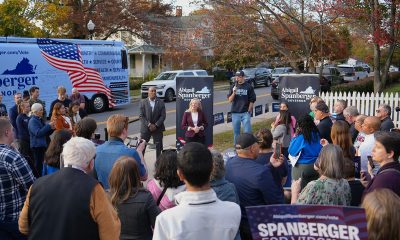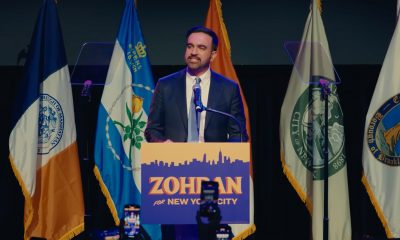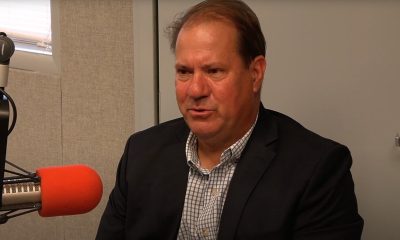News
4 Dutch LGBT advocates arrested in Russia
First foreigners charged under anti-gay propaganda to minors ban
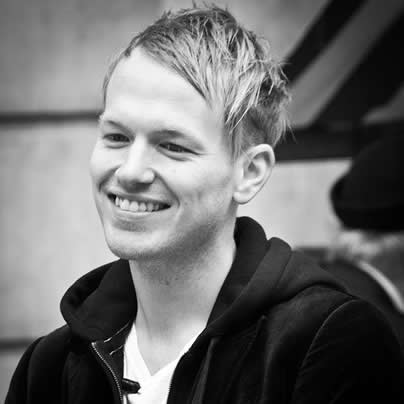
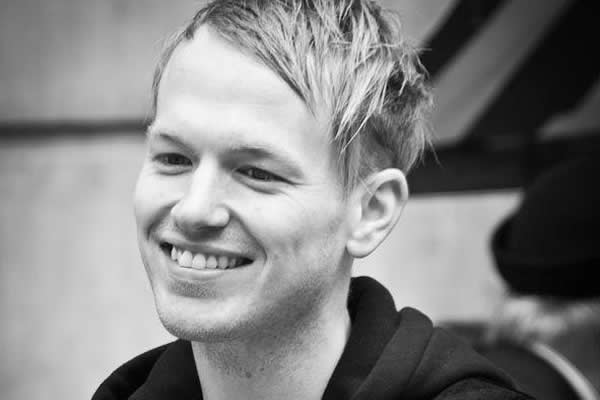
Groningen LGBT President Kris van der Veen (Photo courtesy of Kris van der Veen/Groningen LGBT Foundation)
Russian authorities on Sunday arrested four Dutch LGBT rights advocates for violating the country’s anti-gay propaganda law.
The Russian online newspaper Lenta reported that police detained the activists at a summer camp in the city of Murmansk in the northwestern part of the country during a human rights seminar in which a local LGBT advocacy group was participating. The publication said Kris van der Veen, president of LGBT Groningen, a Dutch LGBT advocacy organization, gave a lecture on gay rights.
Rolf Jurjens of LGBT Groningen confirmed to the Washington Blade from the Netherlands that authorities had arrested van der Veen in Murmansk on Sunday.
Jurjens said van der Veen and the three other Dutch LGBT rights advocates had traveled to the city to film a documentary about gay life in Russia. Local media reports indicate van der Veen interviewed a 17-year-old teenager before authorities took him and the three other activists into custody.
The four activists had been scheduled to appear in a Murmansk court earlier on Monday, but authorities have released them from custody.
Officials reportedly fined them 3,000 rubles ($92.80.)
They are also expected to eventually return to the Netherlands.
“We are still in Murmansk,” van der Veen wrote on his Facebook page in Dutch earlier on Monday. “It is about the documentary, gay propaganda. It is good, but it’s still very vague what’s next.”
Van der Veen and the three other LGBT Groningen members are the first foreigners charged under the “promotion of homosexuality” to minors ban that President Vladimir Putin signed into law in June.
Putin earlier this month signed a second bill that prohibits same-sex couples from other countries from adopting Russian children.
These two laws came into effect against the backdrop of increasing anti-LGBT discrimination and violence in Russia.
Two men in the southern Russia city of Volgograd and on the Kamchatka Peninsula in the country’s Far East have been killed during what local authorities have described as anti-gay attacks in recent months.
Police in St. Petersburg on June 29 arrested 40 LGBT activists and a handful of nationalists who challenged them during a gay rights rally. Authorities in the Russian capital on May 24 arrested 30 LGBT rights advocates who tried to stage a Pride celebration outside Moscow City Hall.
Members of Coming Out, a Russian LGBT advocacy group in St. Petersburg, will go on trial on Thursday under the country’s “foreign agent” law that came into effect last fall.
The U.S. State Department, the European Union and various human rights organizations have repeatedly criticized Russian lawmakers and Putin over their opposition to LGBT rights in the country. Actor Harvey Fierstein is among the growing number of those who have called for a boycott of the 2014 Winter Olympics scheduled to take place in Sochi in February.
“American and world leaders must speak out against Mr. Putin’s attacks and the violence they foster,” the actor and playwright wrote in an op-ed the New York Times published on July 21. “The Olympic Committee must demand the retraction of these laws under threat of boycott.”
“The United States places great importance on the protection of the human rights and fundamental freedoms of all people, including lesbian, gay, bisexual, or transgender persons around the world,” State Department spokesperson Noel Clay told the Blade in a statement on Monday. “We call on Russia to uphold its international commitments regarding freedom of assembly and freedom of expression.”
Jasmine Heiss of Amnesty International also criticized Russian authorities over the Dutch activists’ arrest.
“Ultimately, Amnesty International sees the legislation as an affront to free expression and an attack on minority rights, whether applied to Russian citizens or foreign tourists in Russia,” she said. “As the arrests showed, the legislation represents government sponsored intolerance and violates the prohibition of discrimination.”
District of Columbia
High cost of living shuts essential workers out, threatens D.C.’s economic stability
City residents don’t always reflect those who keep it running

When Nic Kelly finishes her 6 a.m. shift as a manager at PetSmart, she walks to her bartending job at Alamo Drafthouse in Crystal City to serve cocktails, beers, and milkshakes for hundreds of guests.
Kelly, 26, doesn’t work a combined 60-65 hours per week to pocket extra cash –– she does it to barely make her almost $1,700 rent each month.
“I’m constantly working, and some days I work two jobs in the same day,” Kelly said. “But twice now I’ve had to borrow money from my mother just to make sure I pay my full rent.”
Yesim Sayin, D.C. Policy Center executive director, said this is unfortunately how the D.C. area is structured –– to keep essential workers, service employees, and lower-income people out and those with greater economic mobility in.
The DMV area’s high cost of living makes it near-impossible for employees who keep the area running to make a living, Sayin said. In 2022, only 36% of D.C.’s essential workers lived in the city, according to a D.C. Policy Center report. D.C. is also ranked 13th in the world for highest cost of living as of Nov. 7.
But for Sayin, there’s more work for policymakers to get done than simply acknowledging the high cost of living. Take a look at how current policies are impacting residents, and what long-term solutions could help the DMV thrive.
Feeling the high cost of living
D.C. has the highest unemployment rate in the country at 6.0% as of August. Sayin said the city’s high unemployment rate reflects a lack of geographic mobility in its population, meaning those who can’t find jobs can’t afford to look outside of the DMV area.
Though there are job training groups working to close the unemployment gap, securing a job –– let alone two –– rarely guarantees a comfortable lifestyle for essential and service employees.
A single-person household in D.C. with no children must make at least $25.98 an hour to support themselves, according to the Living Wage Calculator. That number jumps to $51.68 an hour for a single adult with one child. Minimum wage in D.C. is $17.95 an hour and $10 an hour for tipped employees.
Whether it’s utilizing free meals at the Alamo to save on groceries or borrowing money to make rent, every week could bring a different sacrifice for Kelly.
While Kelly lives and works a few minutes south of D.C., Sayin said the connectedness of the DMV means you don’t have to travel far to feel the withering effects of the area’s high cost of living.
“People don’t really care what flag adorns their skies,” Sayin said. “They’re looking for good housing, good schools, cheaper cost of living, and ease of transportation.”
For those that stay in the DMV area, those conditions are hard to come by. This can lead to people working multiple jobs or turning to gigs, such as Uber driving or selling on Etsy, to fill income gaps. Sayin said there are short-term benefits to securing these gigs alongside a primary job, such as helping people weather economic storms, avoid going on government assistance or racking up debt.
But she said the long-term implications of relying on gigs or other jobs can harm someone’s professional aspirations.
“You can spend three extra hours on your own profession every work week, or you can spend three hours driving Uber. One gives you cash, but the other gives you perhaps a different path in your professional life,” Sayin said. “And then 20 years from now, you could be making much more with those additional investments in yourself professionally.”
There’s a strong demand for work in D.C., but when the city starts suffering economically, those who live outside the area –– usually essential or remote workers –– will likely find work elsewhere. Sayin said this negatively impacts those employees’ quality of life, giving them less professional tenure and stability.
D.C.’s cost of living also centralizes power in the city, according to Sayin. When lower-wage employees are priced out, the residents who make up the city don’t always reflect the ones who keep it running.
“Ask your Amazon, Uber or FedEx driver where they live. They’re somewhere in Waldorf. They’re not here,” Sayin said.
Working toward an accessible D.C.
Build more. That’s what Sayin said when thinking of ways to solve D.C.’s affordability crisis.
But it’s not just about building more –– it’s about building smartly and utilizing the space of the city more strategically, Sayin said.
While D.C. has constructed lots of new housing over the years, Sayin noted that they were mostly built in a handful of neighborhoods tailored to middle and upper-class people such as The Wharf. Similarly, building trendy small units to house young professionals moving to the city take up prime real estate from struggling families that have much less geographic mobility, she said.
“The affordability problem is that today’s stock is yesterday’s construction,” Sayin said.
Solving these issues includes ushering in a modern perspective on outdated policies. Sayin cited a D.C. policy that places restrictions on childcare centers built on second floors. Since D.C. parents pay the highest rates in the country for childcare at $47,174 annually, she said loosening unnecessary restrictions could help fuel supply and lower costs for families.
Sayin said policymakers need to consider the economic challenges facing residents today, and whether the incentives and tradeoffs of living in D.C. are valuable enough to keep them in the city.
For Kelly, the incentives and tradeoffs of staying in the DMV area aren’t enough. She’s considered moving back in with her mom a few times given how much she has to work just to get by.
Aside from wanting higher compensation for the work she does –– she noted that businesses can’t operate without employees like her –– Kelly also questioned the value of the tradeoff of moving so close to the city.
“There’s no reason why I’m paying $1,700 for a little studio,” Kelly said. “You also have to pay for parking, utilities aren’t included and a lot of residents have to pay for amenities. We are just giving these property management companies so much money, and we’re not really seeing a whole lot of benefit from it.”
Sayin said placing value on the working people of the city will inject fresh life into D.C.’s economy. Without a valuable tradeoff for living in or around the city, there’s little keeping essential and service employees from staying and doing work taken for granted by policymakers.
District of Columbia
Activist hosts Diwali celebration in D.C.
More than 120 people attended Joshua Patel’s party on Nov. 9.

LGBTQ activist and businessman Joshua Patel hosted a community Diwali party on Nov. 9.
Patel organized the event as a community gathering amid the Trump-Vance administration’s policies against LGBTQ inclusion and DEI. The event, held at the Capo Deli speakeasy, drew more than 120 attendees, including local business leaders.
Patel is a franchise owner of ProMD Health, recently awarded as the best med spa by the Washington Blade. He is also a major gift officer at Lambda Legal.
Patel noted that upon moving from New York to Washington in 2022, he desired a chance for community-based Diwali celebrations. He stated that the city offered minimal chances for gatherings beyond religious institutions, unless one was invited to the White House’s Diwali party.
“With our current administration, that gathering too has ended — where we cannot expect more than Kash Patel and President Trump lighting a ‘diya’ candle on Instagram while simultaneously cutting DEIB funding,” Patel said.
In addition to celebrating the festival of lights and good over evil, Patel saw the event as a moment to showcase “rich, vibrant culture” and “express gratitude.”
Patel coined the celebration a “unifier.”
“From a spiritual angle, Shiva was the world’s first transgender God, taking the form of both “male” and “female” incarnations,” Patel said. “The symbolism of our faith and concepts are universal and allows for all to rejoice in the festivities as much or little as they desire.”
Savor Soiree, DMV Mini Snacks and Capo Deli catered the event. DJ Kush spun music and Elisaz Events decorated the Diwali celebration.
The Diwali party also featured performances by former Miss Maryland Heather Young Schleicher, actor Hariqbal Basi, Patel himself and Salatin Tavakoly and Haseeb Ahsan.
Maryland
Harford school board appeals state’s book ban decision to circuit court
5-2 ruling in response to ‘Flamer’ directive

By KRISTEN GRIFFITH | Marking a historic moment in Maryland’s debate over school library censorship, Harford County’s school board voted Thursday to appeal the state’s unprecedented decision overturning its ban of a young adult graphic novel, pushing the dispute into circuit court.
The 5-2 vote followed a recent ruling from the state board overturning Harford’s ban of the book “Flamer.” In a special meeting Thursday afternoon, board members weighed whether to seek reconsideration or take the matter to circuit court — ultimately opting to appeal.
The book “Flamer” is by Mike Curato, who wrote about his experience being bullied as a kid for being gay.
The rest of this article can be found on the Baltimore Banner’s website.
-

 Politics4 days ago
Politics4 days agoPro-trans candidates triumph despite millions in transphobic ads
-

 Opinions4 days ago
Opinions4 days agoDemocratic Socialism won’t win the whole country
-

 National4 days ago
National4 days agoUS bishops ban gender-affirming care at Catholic hospitals
-

 Maryland5 days ago
Maryland5 days agoSalisbury, Md. rainbow crosswalk removed on Veterans Day





